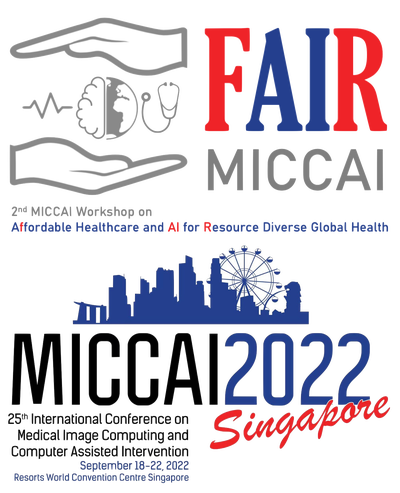We are looking for contributions on (a) making AI affordable for healthcare, (b) making healthcare affordable with AI, or (c) pushing the frontiers of AI in Healthcare that enables (a) or (b). we aim to attract technical contributions addressing medical problems of emerging and developing countries via algorithms, with a sharp focus on affordability, for example, high model performance/accuracy using low-computational resources and limited technology/infrastructure.

Background
As we witness a technological revolution that is spinning diverse research fields including healthcare at an unprecedented rate, we face bigger challenges ranging from the high cost of computational resources to the reproducible design of affordable and innovative solutions. While AI applications have been recently deployed in the healthcare system of high-income countries, its adoption in developing and emerging countries remains limited. Given the breadth of challenges faced particularly in the field of healthcare and medical data analysis, we present the first workshop aiming to i) raise awareness about the global challenges in healthcare, ii) strengthen the participation of underrepresented communities at MICCAI, and iii) build a community around Affordable AI and Healthcare in low resource settings.
Our workshop stands out from other MICCAI workshops as it prioritizes and focuses on developed AI solutions and research suited to low infrastructure, point-of-care-testing, and edge devices. Examples include, but are not limited to AI deployments in conjunction with conventional X-rays, Ultrasound, microscopic imaging, retinal scans, fundus imaging, and skin lesions. Moreover, we encourage works that identify often neglected diseases prevalent in low-resource countries and propose affordable AI solutions for such diseases using medical images. We are looking for contributions on (a) making AI affordable for healthcare, or (b) making healthcare affordable with AI, or (c) pushing the frontiers of AI in Healthcare that enables (a) or (b).
There are formidable challenges that remain untackled in this field which are spanned by different questions: (1) How to promote knowledge sharing between AI institutions for developing countries?; (2) how to build robust and affordable solutions that can be used with limited technology, poor-quality data and/or unstable communication; and (3) how can we propel the collection and analysis of data for underrepresented populations with limited quality and annotation? (4) how can we encourage computer scientists and clinicians to identify unmet clinical needs in neglected diseases that can benefit from affordable AI solutions? —just to raise a few.
Important Dates
25 June 20222 July 2022 Paper submissions due16 July 202218 July 2022 Notification of paper decisions30 July 20225 Aug 2022 Camera ready papers due- 18 September 2022 3:40 PM to 7:10 PM (SGT time) Workshop date
- Workshop proceedings is available here